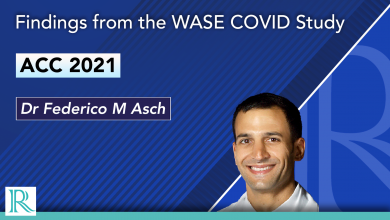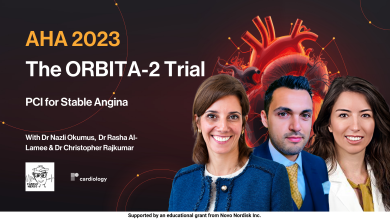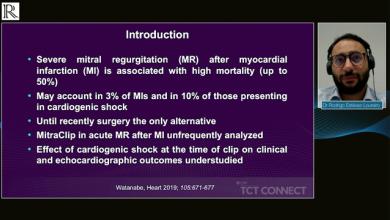Search results
Author(s):
Federico M Asch
Added:
2 years ago
Dr Federico M Asch (MedStar Health Research Institute, Georgetown University, WA, US) discusses the results of a study comparing human vs machine learning-based echocardiography analysis applied as a predictor of outcomes in acute Covid-19 patients.
Questions
1. What are the benefits of the machine learning approach in echocardiography analysis?
2. What is the WASE COVID Study?
3. What was the…
View more
Diana Gorog
Research Area(s) / Expertise:
Job title: Cardiologist and Clinical Lead for Non-cancer Research
Author
Ghada Mikhail
Research Area(s) / Expertise:
Job title: Consultant cardiologist
Author
Author(s):
Rasha Al-Lamee
,
Christopher Rajkumar
,
Nazli Okumus
Added:
5 months ago
AHA 2023 — Investigators of ORBITA-2 trial, Dr Rasha Al-Lamee and Dr Christopher Rajkumar (Imperial College London, UK) talked with CardioNerds Ambassador, Dr Nazli Okumus about the randomised, placebo-controlled trial (NCT03742050) that compared the effects of coronary angioplasty versus placebo procedure on symptoms of stable angina without background anti-anginal therapy at 12 weeks.The ORBITA…
View more
View from the Thoraxcenter: ESC 23 Wrap Up
Video Series
Added:
3 years ago
Dr Rodrigo Estévez-Loureiro (University Hospital Alvaro Cunqueiro, Vigo, SP) discusses the outcomes of MitraClip in patients with acute mitral regurgitation in AMI with and without cardiogenic shock.
Questions
1. What is the background of the study?
2. How did you define cardiogenic shock?
3. What was the design, patient population and endpoints?
4. What were the key results?
5. What…
View more
Author(s):
Mahadevappa Mahesh
Added:
3 years ago
Coronary artery disease (CAD) represents the major cause of morbidity and mortality in Western populations.1 The prime diagnostic tool that allowed the development of rational treatment techniques for this disease is invasive coronary angiography ((CA) an X-ray fluoroscopy guided procedure), which is associated with a low rate of life-threatening complications.2 More than 40% of the invasive CA…
View more
Author(s):
Raoul Bonan
,
Anita W Asgar
Added:
3 years ago
Coronary angioplasty has revolutionized the treatment of coronary artery disease. Over the past two decades the field has seen numerous innovations in an attempt to perfect the percutaneous management of coronary atherosclerotic disease. The development of coronary stenting was a major advance in preventing elastic recoil and treating dissections following balloon angioplasty.1 Unfortunately,…
View more
Author(s):
Deborah A Chyun
Added:
3 years ago
Individuals with both type 1 and type 2 diabetes mellitus (DM) are known to be at high risk for developing coronary artery disease (CAD). The risk is two to three times greater in those with DM compared with those without, and is especially high in women with DM. An additional problem in individuals with DM is that, even with severe underlying CAD, many individuals may have atypical symptoms or…
View more
Author(s):
Robert C Hendel
Added:
3 years ago
Background
Heart disease, specifically coronary artery disease (CAD), is the leading cause of death and disability among both men and women in the US. Reductions in blood supply due to narrowings of the arteries that supply the heart muscle with oxygen and nutrients (coronary arteries) result in chest pain and shortness of breath and may lead to permanent scarring of the heart muscle, as in the…
View more















 « First
« First